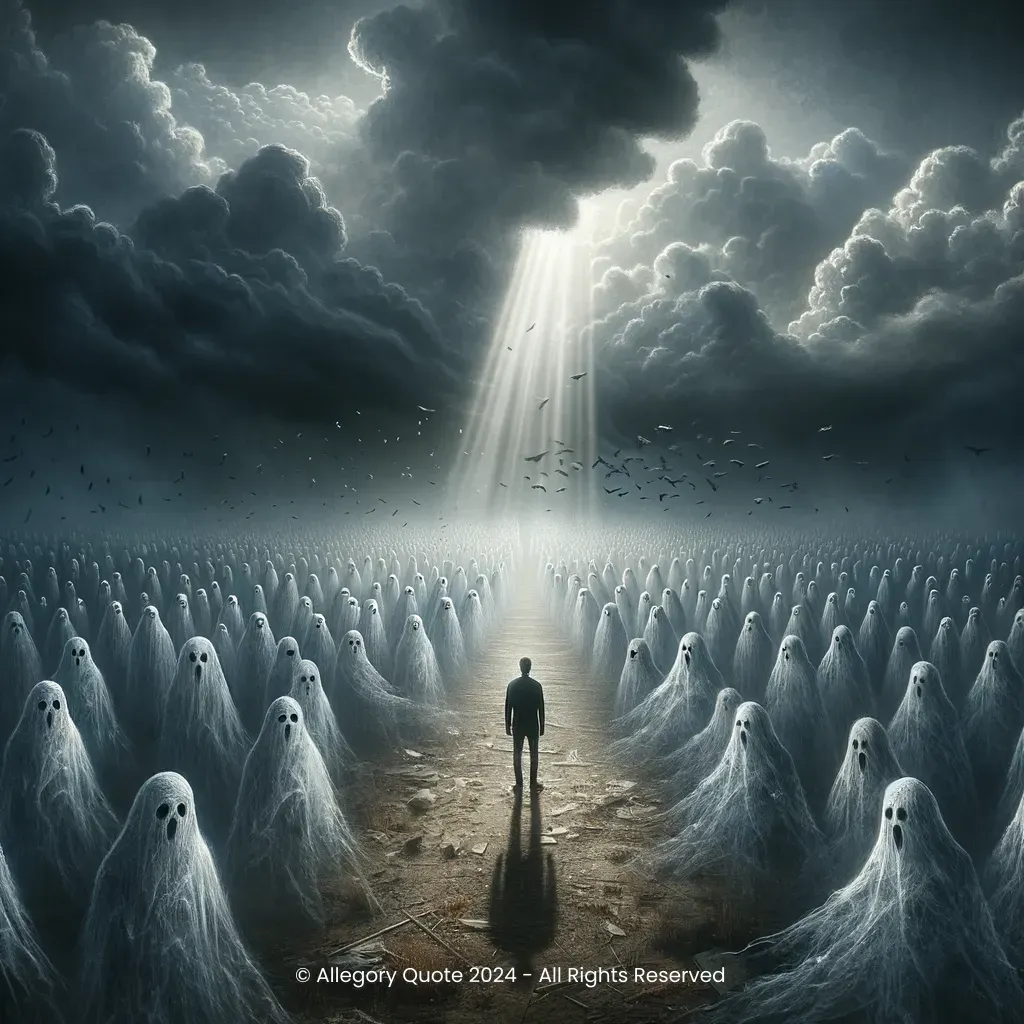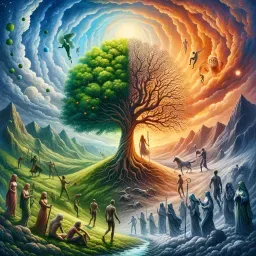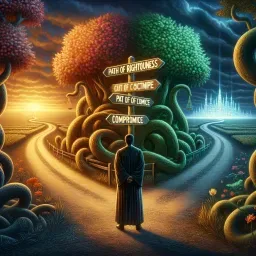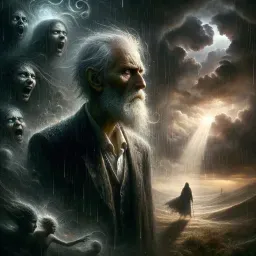”When sorrows come,
they come not single spies, but in battalions“

0
0
0
0
- Meaning
- This phrase from "Hamlet" encapsulates a profound observation about human suffering: it often seems that troubles do not arrive alone but pile up in overwhelming numbers. Shakespeare uses the metaphor of "single spies" and "battalions" to illustrate that sorrows, like an army, can invade and conquer one's life en masse, not just in isolated instances. This reflects the common experience that when things go wrong, they tend to go wrong all at once, amplifying the sense of despair and helplessness.
- Allegory
- In this image, the darkened battlefield represents the setting of overwhelming challenges, while the solitary figure signifies the individual's struggle against compounded woes, depicted as spectral soldiers. The gathering storm clouds suggest impending difficulties, while the radiant beam of light breaking through symbolizes hope and resilience. The intricate designs of the spectral figures reflect the multifaceted nature of human suffering, capturing the quote's essence about the collective and complex nature of sorrows. This visualization serves to remind viewers of the possibilities of resilience and light even in the darkest times.
- Applicability
- In personal life, the teaching of this phrase can be applied as a reminder that periods of difficulty might feel more intense due to the accumulation of problems, rather than isolated incidents. Recognizing this can help individuals anticipate and manage their reactions better, fostering resilience. It suggests the importance of preparing for and dealing with multiple issues pragmatically and seeking support when necessary to withstand these battalions of troubles.
- Impact
- This phrase has had a significant cultural impact, often cited to convey the experience of cascading misfortune. Its resonance lies in its poetic encapsulation of a universal human experience, making it pertinent in literature, psychology, and everyday conversations. It has inspired numerous interpretations and adaptations in various forms of art and literature, continuing Shakespeare’s influence throughout centuries.
- Historical Context
- "Hamlet" was written around 1600-1601 during the Renaissance period in England. This era, characterized by a heightened appreciation for art, exploration, and humanism, provided a rich backdrop for Shakespeare's exploration of complex human emotions and societal themes. The turmoil depicted in "Hamlet," including this line about sorrows, mirrors the uncertainties and struggles experienced during both personal and broader historical crises of that time.
- Criticisms
- As with many Shakespearean phrases, this quote's interpretation can be subjective. Some critics might argue that it promotes a deterministic view of suffering, implying an almost inevitable avalanche of misfortune, which could potentially foster a negative mindset. Others might contend that it doesn’t account for individual agency and the human capacity for overcoming adversity. Despite these perspectives, the phrase remains a poignant reflection on human perception of suffering.
- Variations
- Variations of expressing the accumulation of woes can be found in other cultures. For instance, the Chinese proverb "不幸中的万幸" (bú xìng zhōng de wàn xìng) translates to "among ten thousand misfortunes, a single stroke of good fortune," reflecting on the rarity of good fortune amidst numerous misfortunes. Different cultures interpret the experience of collective sorrows uniquely, demonstrating a shared yet diverse human experience.
-

To weep is to make less the depth of grief.
-

Good night, good night! Parting is such sweet sorrow.
-

There is nothing either good or bad but thinking makes it so.
-

I cannot lose the only thing that keeps me alive: hope. A word that is often with us in the morning, gets wounded throughout the day, and dies at dusk, but resurrects with the dawn.
-

To do a great right, do a little wrong.
-

I am not bound to please thee with my answers.
-

I must be cruel, only to be kind.
-

Perseverando vinces.
-

I am a man more sinned against than sinning.
-

To be, or not to be, that is the question.
-

But, for my own part, it was Greek to me.
-

Look before you leap.
No Comments